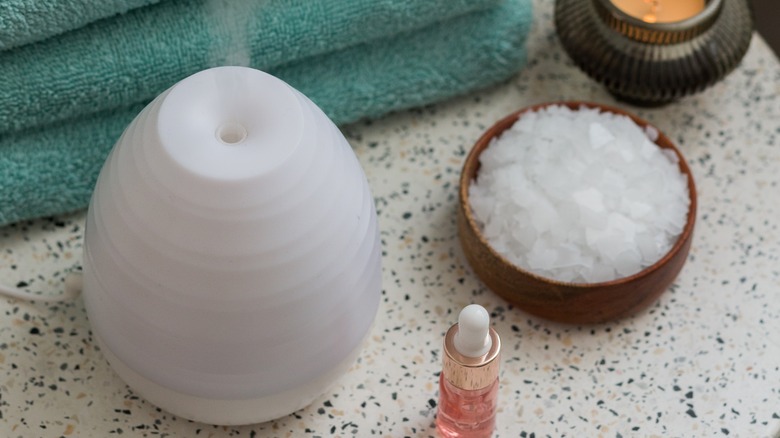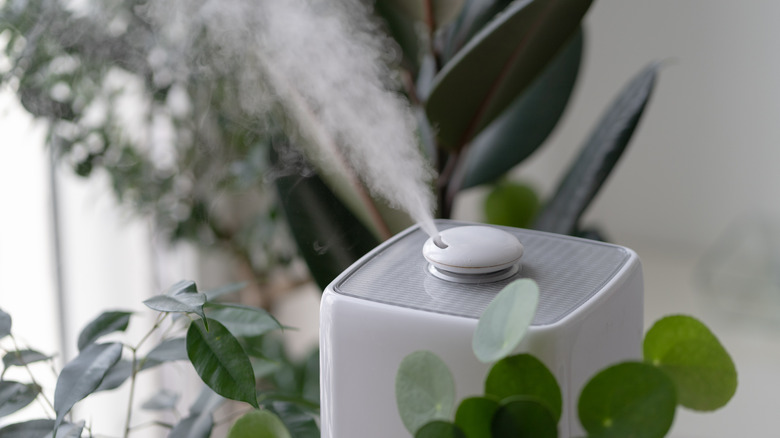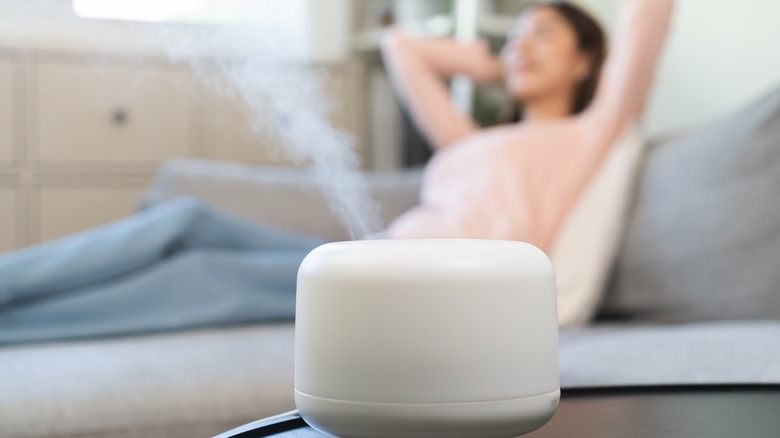Why Some People Put Salt In Their Humidifier (& Should You?)
We may receive a commission on purchases made from links.
Humidifiers are one of the best ways to infuse your home with moisture, which can be essential in very dry weather periods. Humid air can be great for alleviating cold and asthma symptoms, and humidifiers can even help your favorite house plants thrive. These home devices diffuse a water vapor through cold mist or steam, which then evaporates into the air as it disperses. One bit of common advice you might stumble upon for getting the most out of your humidifier is to add salt. The belief is that this boosts the vapor production, as the salt helps the water conduct heat better, giving you more steam, and increased steam equals moister air. Some folks even opt for essential oil-infused Epsom bath salts, like eucalyptus and menthol, believing that the aroma provides additional respiratory benefits. But does that mean it's a good idea to add salt to your home humidifier?
Unfortunately, there's no hard rule to this question, as it depends on a few things. For one, some models are suited to salt while others aren't, and in some cases, salt can actually damage humidifiers by corroding the electrical pieces as you are essentially adding a brining mixture to an electronic device. We'll walk you through whether or not you should add salt to your humidifier, and what risks you need to be aware of.
Check your humidifier manual before adding salt
As we mentioned, some humidifier models actually recommend adding a small amount of salt to your humidifier, such as Vick's Vaporizer, in the case that the humidifier isn't producing enough steam. That's because, as a conductive mineral, salt helps produce steam. The only way to know for sure if your humidifier is compatible with salt is to look at the manual or the product's FAQ online. If this information isn't easily accessible, you can also check if the manual requires distilled, mineral-free water as well. If it does, you can intuit that you shouldn't put salt in it — table salt breaks down to sodium chloride, and Epsom salts into magnesium and sulfur, both of which are hard minerals that can corrode and clog humidifiers when the water is dissolved.
You can also look for a model that is specifically designed to be used with salt, such as the Yaledi Himalayan salt diffuser, which is available on Amazon for $22.99. These models use large salt rocks that sit on top of the diffuser rather than in the water tank. This can help prevent corrosion as the salt still absorbs the moisture but doesn't actually make contact with any of the internal electrical components. This would be an excellent solution for those who want to enjoy some of the wellness benefits of humidifiers and salt.
Use caution when adding salt
If your humidifier's manual does indicate that it's safe to use with salt, you still want to only use a little. Vick's Vaporizer, for instance, says to only add 1/8 teaspoon of salt if the humidifier has stopped producing steam, which is little more than a pinch. Vick's also notes that switching from distilled water to tap water, which contains hard minerals, can also help steam production, so that may be a safer bet than using table or Epsom salts.
For those who find their humidifiers producing little to no steam, we recommend giving the machine a thorough clean before turning to salt. You're probably not cleaning your humidifier nearly enough, even if you only ever add water to it. Mineral water can leave hard water deposits such as magnesium and calcium behind, which can create blockages that keep your humidifier's mist from escaping. Take our advice and give your humidifier the clean of a lifetime with hydrogen peroxide to keep it functioning perfectly.
Additionally, be aware that adding too much salt can not only harm your machine, but actually be dangerous. That's because an excess of minerals in the water can conduct heat a little too well and cause the water in the machine to boil and spat hot steam out, and even blow a fuse in the machine. Don't leave the humidifier unattended if you do add salt to it so you can monitor the reaction.


